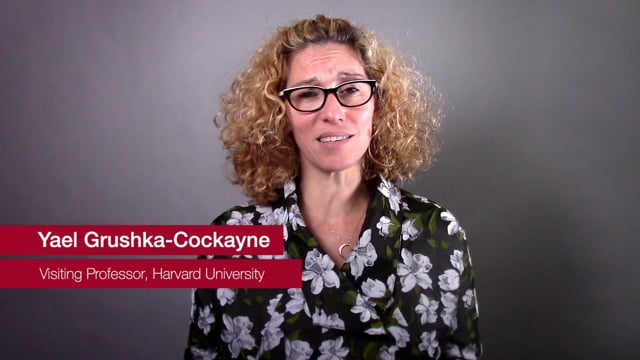Data Science for Business
Move beyond the spreadsheet
Designed for managers, this Harvard Online course provides a hands-on approach for demystifying the data science ecosystem and making you a more conscientious consumer of information.

4–5 hours per week
4–5 hours per week
What You'll Learn
What is data-driven decision making, and how can a better understanding and use of data impact your business or organization?
Data is only as useful as the insights you can collect.
Data Science for Business will help you appreciate the full benefits of data-driven decision making and teach you the business analytics tools and techniques to effectively understand, visualize, and analyze the data available to you.
The course is part of the Harvard on Digital Learning Path and will be delivered via HBS Online’s course platform. Learners will be immersed in real-world examples from experts at industry-leading organizations.
By the end of this data science course for business leaders and managers, participants will be able to:
- Develop a foundational understanding of data science tools, processes, and models.
- Use business analytics and data science to build a framework that will support data-driven decisions leading to organizational success.
- Identify and avoid common mistakes while interpreting datasets, metrics, and visualizations.
- Create a data-driven framework for your organization and yourself; develop hypotheses and insights; and identify data and missing components.
- Put key techniques into practice such as data curation, regression models, prediction and analyses, and visualization.
- Read basic code in order to comprehend the syntax that informs data requests.
- Assess applicable methodologies in statistics, data analytics for business, and data science.
Career Impact and Outlook
Data-driven skills are on the rise! Since January 2021, there has been a significant increase in management-level jobs listing “Data-Driven Decision Making” as a required skill. Further, since March 2023, there have been more than 1.2 million job postings looking for talent with skills including “Data-Driven Decision Making” and "Data Analysis", while only 3% of job seekers list these skills.
Data: Source: Lightcast™
Learn from Industry Experts
Your Instructor
Yael Grushka-Cockayne is the Altec Styslinger Foundation Bicentennial Chair in Business Administration and Senior Associate Dean for Professional Degree Programs at the University of Virginia Darden School of Business and was formerly a Visiting Professor of Business Administration at Harvard Business School and Professor of Business Administration. Her research and teaching activities focus on data science, forecasting, project management, and behavioral decision-making. Her research is published in numerous academic and professional journals, and she is a regular speaker at international conferences in the areas of decision analysis, project management, and management science. In 2014, Grushka-Cockayne was named one of "21 Thought-Leader Professors" in Data Science.
Real World Case Studies
Affiliations are listed for identification purposes only.

Temple Fennell
Temple Fennell is the CEO and founder of ATO Pictures, LLC, a motion pictures finance, production and distribution company that provides U.S. distribution and production funding. Step into Hollywood and explore how this company used data to identify box office success in the entertainment industry.

Paul Matherne, MD
Paul Matherne, MD is a pediatric cardiologist and the associate chief medical officer for UVA Children's. He will demonstrate how even preemies can benefit from data science in the case of a children’s hospital’s bid to expand the NICU.

Susanna Gallani
Susanna Gallani is an Assistant Professor Of Business Administration at Harvard Business School. She used data to determine if employees were fully engaged at work and will analyze how data can be used to fine-tune incentive strategies.
Syllabus and Upcoming Calendars
Data Science for Business provides a hands-on approach for demystifying the data science ecosystem and making you a more conscientious consumer of information.
Learning requirements: There are no prerequisites required to enroll in this course. In order to earn a Certificate of Completion from Harvard Online and Harvard Business School Online, participants must thoughtfully complete all 5 modules, including satisfactory completion of the associated assignments, by stated deadlines.
- Study good data and bad buys in a case study about Carvana
- Translate business problems into data hypotheses
- Explore and describe datasets
- Use visualizations to generate hypotheses
- Relate the quality of data with the the quality of the conclusions by studying the Fannie Mae case on investment identification
- Prepare and clean data for analysis
- Examine data dictionaries
- Design table joins
- Identify solutions for managing missing data
- Critique existing charts and identify methods of improvement through the exploration of the StockX case on demand.
- Generate insight with graphs
- Design visualizations to express data clearly
- Connect yesterday’s data with tomorrow’s prediction
- Evaluate temporal patterns in data
- Match the time scale with the business problem
- Select appropriate smoothing techniques for time series forecasting
- Study the Bark Gift Shop case on motivating managers and the ATO Pictures case on marketing movies
- Identify relationships between variables
- Write hypotheses
- Explain the parts of a linear model, including interactions and dummy variables
- Interpret linear regression results
- Revisit the Carvana and Fannie Mae cases from earlier modules
- Complete a confusion matrix
- Interpret results from logistic regression, CART, random forest, lasso, and neural networks
- Select a model to guide decisions
Available Discounts and Benefits for Groups and Individuals
Experience Harvard Online by utilizing our wide variety of discount programs for individuals and groups.
Past Participant Discounts
Learners who have enrolled in at least one qualifying Harvard Online program hosted on the HBS Online platform are eligible to receive a 30% discount on this course, regardless of completion or certificate status in the first purchased program. Past Participant Discounts are automatically applied to the Program Fee upon time of payment. Learn more here.
Learners who have earned a verified certificate for a HarvardX course hosted on the edX platform are eligible to receive a 30% discount on this course using a discount code. Discounts are not available after you've submitted payment, so if you think you are eligible for a discount on a registration, please check your email for a code or contact us.
Nonprofit, Government, Military, and Education Discounts
For this course we offer a 30% discount for learners who work in the nonprofit, government, military, or education fields.
Eligibility is determined by a prospective learner’s email address, ending in .org, .gov, .mil, or .edu. Interested learners can apply below for the discount and, if eligible, will receive a promo code to enter when completing payment information to enroll in a Harvard Online program. Click here to apply for these discounts.
Gather your team to experience Data Science for Business and other Harvard Online courses to enjoy the benefits of learning together:
- Single invoicing for groups of 10 or more
- Tiered discounts and pricing available with up to 50% off
- Growth reports on your team's progress
- Flexible course and partnership plans
In order to receive the early bird price of $950 for the November 2024 of Data Science for Business, you must enroll and complete payment before July 31, 2024. In order to meet this deadline, we recommend that you submit your application no later than July 25, 2024 to allow for application processing time.
Learn More
Explore and connect with articles, webinars, and more.
